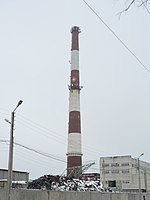Pavlovo Bus Factory
 | |
 Chimney of Pavlovo bus factory | |
| Company type | Public company |
|---|---|
| MCX: PAZA | |
| Industry | Automotive, ISIC: 2910 |
| Founded | 1932 |
| Headquarters | , |
Key people | Andrei Vladimirovich Vasiliev |
| Products | Buses |
| Revenue | $256 million[1] (2017) |
| $7.54 million[1] (2017) | |
| $12.4 million[1] (2017) | |
| Total assets | $339 million[1] (2017) |
| Total equity | $102 million[1] (2017) |
| Parent | GAZ Group Bus Division |
| Website | www |


Pavlovo Bus Factory (Russian: Павловский автобус, formerly Па́вловский авто́бусный заво́д, Pavlovsky Avtobusny Zavod or PAZ) is a manufacturer of buses in Russia, in the city of Pavlovo, Nizhny Novgorod Oblast. PAZ is a subsidiary of Russian Buses which is a division of GAZ.
Pavlovo Bus Factory specializes in designing and manufacturing buses of the small/medium class (length 9.7 m). Buses are the most common plant in Russia, their annual output is over 10,000 units, almost 80% of small buses in Russia. The small PAZ buses have long been used by Russian "fixed-route taxi" (marshrutka) operators.
Starting in 2015, the GAZ Group introduced a single brand for all its bus manufacturing subsidiaries, and newly manufactured vehicles now feature the deer badge of the GAZ company.[2]
History
[edit]The factory has its origins in the ZATI automobile and tractor tool plant, established in Pavlovo in 1932.[3] The building of the factory started in 1952, and in the same year the first PAZ-651 long-hood buses (based on the GAZ-51 general-purpose lorry) were produced. The government had a plan to produce 10,000 buses per year. In 1960, the production of new PAZ-652 forward control model on the same chassis started. It was replaced by the outwardly similar PAZ-672 (based on the GAZ-53 lorry) in early 1968, and this bus had a large family of various modifications. 1989 saw a start of production of the new PAZ-3205 model having basically the same chassis but a completely new body.
Models
[edit]Current
[edit]- PAZ-3205 (1989–present)
- PAZ-3206 (1995–present)
- PAZ-3237 "Luzhok" (2002–present)
- PAZ-4234 (2003–present)
- PAZ-3203 (2006–present)
- PAZ-3204 (2006–present)
- PAZ Vector 4 (2012–present)
- PAZ Vector 3 (2015–present)
- GAZ Vector Next (2016–present)
Former
[edit]- PAZ-651 (1950-1961, based on GAZ-51I)
- PAZ-651A (1961-1971)
- PAZ-652 (1958-1968)
- PAZ-653 (1950–1956, ambulance version of PAZ-651)
- PAZ-655 (1954–?, armored van version of PAZ-651)
- PAZ-657 (1954–1958, bread van version of PAZ-651)
- PAZ-661 (1954–1956, clothing van version of PAZ-651)
- PAZ-661B
- PAZ-672 (1967-1989)
- PAZ-3201 (1972-1989, based on GAZ-66)
- PAZ-5272 (1999-2003)
- PAZ-4230 Aurora (2001-2002, production moved to KAvZ)
- PAZ-4238 Aurora (2001-2002, production moved to KAvZ)
- PAZ Real (2007-2009)
Panel vans
[edit]- PAZ-657 (1954–1958, based on GAZ-51)
- PAZ-659
Trailers
[edit]- PAZ-658
- PAZ-740
- PAZ-742
- PAZ-743
- PAZ-744
- PAZ-746
- PAZ-750
Prototypes
[edit]- PAZ-665 (1964)
- PAZ-671 (1958, based on GAZ-52)
- PAZ-671A (1958, based on GAZ-53)
- PAZ-671G (based on GAZ-52A)
- PAZ-675 (1960, based on GAZ-52)
- PAZ-985 (1960)
- PAZ-3202 (1973)
- PAZ-3203 (1972)
- PAZ-3204 (1974)
Around the world
[edit]- One PAZ-672 came to Chile between 1970 and 1971 with the installation of the soviet KPD factory of concrete blocks for prefabricated buildings, in Quilpué [1]. This was one of the many symbols of the relation between the Soviet Union and the Unidad Popular government in Chile.
Gallery
[edit]-
PAZ-672
-
PAZ-672 Emergency Gas Service Command Bus in Moscow
-
PAZ-3205
-
PAZ-3204
-
PAZ-3237 in Moscow
-
PAZ-4230 "Aurora" in Gatchina
-
PAZ-4234
-
A row of new PAZ school buses in the central square of Chisinau, Moldova
-
PAZ Vector 3 (right) and Vector 4 (left)
References
[edit]- ^ a b c d e "Бухгалтерская отчётность". Retrieved 7 November 2018.
- ^ "Likino Bus Plant". gazgroup.ru. Archived from the original on 8 April 2017. Retrieved 30 April 2017.
- ^ "История завода". Paz.nnov.ru. 10 June 2000. Archived from the original on 10 June 2000. Retrieved 6 July 2017.









